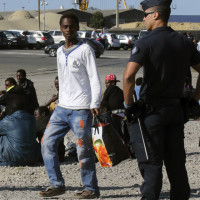Anglo/French unit aims to root out migrant trafficking gangs

The Home Office has announced a new “command and control centre” for tackling smuggling gangs in Calais, where thousands of migrants desperate to cross the Channel are living in slum-like conditions.
The facility is to be a joint enterprise staffed by British and French police at the northern French port, which has dominated the British media this summer as refugees made repeated attempts, often in broad daylight, to reach Britain aboard freight lorries and via the Channel Tunnel.
As part of the deal signed on Thurssday by Home Secretary Theresa May and her French counterpart Bernard Cazeneuve, police officers led by one British and one French senior commander will be deployed to Calais to combat gangs smuggling migrants and refugees across the Channel.
Those trying to reach Europe include some refugees and “many many economic migrants,” Mrs May said.
The Centre, which will be close to the Eurotunnel entrance, will employ extra French policing units, additional freight searches, additional fencing, security cameras, flood lighting and infrared detection technology. The Home Secretary claims it will also boost humanitarian assistance for the migrants in a bid to ease the desperate conditions in Calais.
At least 10 migrants have lost their lives attempting to cross to the UK from Calais in the past two months. An estimated 3,000 more are living in ramshackle ‘camps’ without adequate shelter or sanitation. Originally from Africa, the Middle East and Asia, many have given up trying to hide on UK-bound vehicles and are resigned to relying on hand-outs from charitable agencies.
The issue has strained ties between politicians in Paris and London. French ministers claim it is too easy to work illegally in the UK and that Britain’s welfare regime is too liberal, while Westminster is concerned about what it believes are security failings in Calais and the various points migrants manage to enter France, which is a signatory to the Schengen Agreement, which allows unfettered movement free from security checks across member states’ common borders.
Keith Vaz, who chairs a parliamentary body scrutinising the work of the Home Office, welcomed the agreement but warned there was already evidence of greater “illegal activity” at other Channel ports in France, Belgium and the Netherlands.
“Closing off one route will only mean the problem moves to another port,” he said.
“We need agreements with countries across the north coast (of Europe) to stop this situation developing before we see Calais-like crises spring up at ports across the continent.”
Theresa May told reporters there had been “an excellent level of cooperation” between British and French governments, but agreed wider efforts in Europe were also needed.
She said Britain had begun talks with Belgium and the Netherlands, as the UK government was “very well aware of the possibility of displacement” of people trafficking operations if security was strengthened at Calais.
Security measures at other northern French ports, which include Dunkerque, Le Havre and Dieppe, were also being scrutinised, the Home Secretary said, adding: “Migrants are trying to come to Europe with organised gangs, people smugglers, trafficking people through to Europe. What we see here is a symptom of a wider problem.”
Britain has pledged £22 million so far towards improving security at the French end of the Channel Tunnel. Prime Minister David Cameron has in the last fortnight promised “more fencing, more resources, more sniffer dog teams” to aid French police. But the tighter security has merely pushed up prices for the migrants and refugees who pay smuggling gangs to sneak them across.
“Getting into a lorry cost 500 euros just a few months ago, now it’s 800-900 euros because there are so many more police and sniffer dogs,” NGO worker Francois Guennoc told journalists.
Channel Tunnel operator Eurotunnel said the number of attempts to breach the undersea rail link had fallen to around 150 a night this week, from a high of 1,700 in late July. The number includes multiple attempts by the same refugees.
The numbers trying to reach Britain are a tiny fraction of those entering other European countries, particularly Germany, which said this week it expects a new record of 800,000 asylum seekers in 2015 – far exceeding the 500,000 initially expected.
Madeleine Sumption, director of the Migration Observatory at Oxford University, told BBC Radio 4’s Today programme that compared to 200,000 asylum applications in Germany last year, the UK had just over 30,000. The UK government faced challenges in trying to distinguish between illegal immigrants and asylum seekers, and “there won’t be a 100% success rate”, she said.
German Chancellor Angela Merkel recently warned that the issue could become a bigger challenge for the European Union than the Greek debt crisis.








